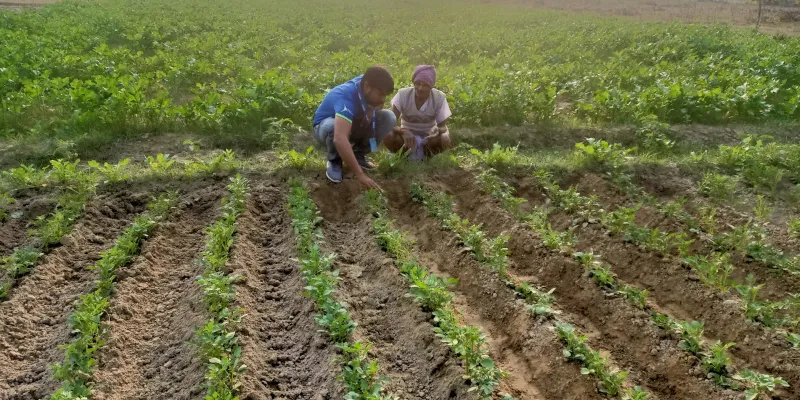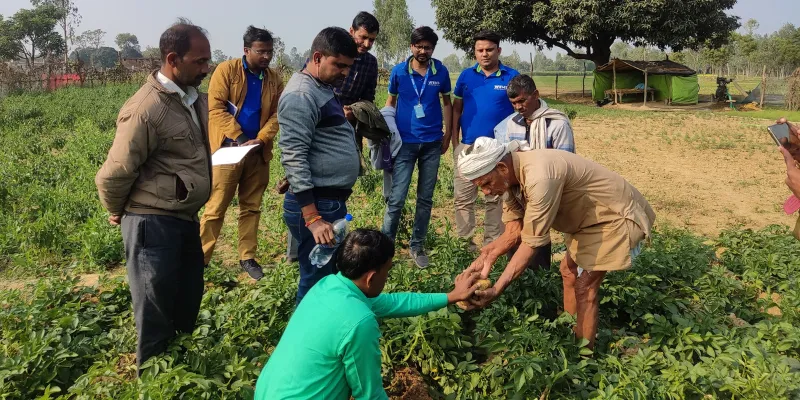De-risking agriculture: How this startup helps small farmers produce higher yields
WRMS provides a range of tech-driven input advisory services to farmers to enable higher yields, backing it with guaranteed purchase of their produce.
With agriculture playing a vital role in India’s economy, employing 54.6 percent of the workforce, many farmers rely on weather forecasts to make better agricultural decisions such as sowing crops on time.
Smallholder farmers are especially dependent on accurate weather information as unexpected rainfall or any other extreme weather conditions can lead to financial ruin. IIT Kanpur incubated agritech startup (WRMS) says it’s well-positioned to address the needs of this segment.
Founded in 2004 by Sonu Agrawal, Anuj Kumbhat, and Ashish Agarwal, the Gurugram-headquartered company has fine-tuned its solutions for the Indian agriculture sector over the last 18 years. It started by providing weather advisory services to insurance companies who would use it to frame crop insurance policies. Later, the startup also started sending weather alerts to farmers.
The real boost for WRMS came around 2015-16 with the increased usage of smartphones and cheaper data plans which gave wider access to online information. However, it also realised that just providing weather information was not enough for the farmers.

WRMS executive interacting with a farmer
“We realised that farmers needed further actionable insights that extend beyond the weather services to improve agricultural yield,” says Anuj Kumbhat, Co-founder and CEO, WRMS in a conversation with YourStory.
The startup focused on building its technology infrastructure, including automatic weather stations (AWS) to collect relevant data, and also gathered other related information from various sources. Today, it has over 10,000 AWS spread across the country.
Direct touch with farmers
In 2019, WRMS started to directly engage with the farmers by providing them with various input advisory services under the brand name—SecuFarm. Building on its expertise in weather forecasting, the company extended its services to areas such as soil moisture condition, pest control, water management etc.
“We can now tell the farmers when is the right time to sow their seeds or how frequently they should spray to ward off pests,” he adds.
WRMS offers these advisory services for a fee to farmers—an average of Rs 1,000-2,000 per season, depending on the crop as well as area of cultivation. It also offers to buy their produce at the market price provided they follow its inputs. The startup aims to reduce the risks associated with farming.
“As long as farmers follow our advisories, there is a guarantee of higher yield outcomes in the range of 15-20 percent,” says Anuj.
He further claims that WRMS’ advisory services also help farmers lower the agricultural costs by optimising irrigation and only using the right agri inputs.
“We suggest only those inputs which fall within our best packages practices and do not believe in multiple options,” he explains.
The package includes timely interventions, irrigation requirements, soil testing, nutrition management etc. These are backed by machine learning and artificial intelligence models.
To date, WRMS has engaged with over 1,30,000 farmers across 10 states like Harayana, Uttar Pradesh, Madhya Pradesh, and Telangana, and has also partnered with the various state governments. It focuses on agricultural areas that grow two to three crops a year, and are equipped with irrigation facilities. Most of these farmers own two to 10 acres of land.

The startup also works with farmer-producer organisations, corporate farming companies, agri-input firms etc.
It earns through multiple revenue streams including advisory fees, weather data service subscription, and charging from agri-input companies.
Bootstrapped venture
WRMS has largely been a bootstrapped venture and over time, has received grants from organisations such as UPL, ILO (International Labour Organisation), Ford Foundation, and most recently, Insuresilience Solutions.
The company reported a revenue of $4.2 million for FY22 and says it’s profitable. It recorded a 60 percent growth in revenue over the last two years.
However, the startup’s journey wasn’t without its share of challenges. It took time for the company to build a relationship with farmers and gain their confidence. Giving an example, Anuj says that they started working with 400 farmers in Haryana, and it took them three cropping seasons to reach 4,000.
WRMS, which has a team of around 300 members, also faced challenges in building market linkages for the agricultural produce that it procures from farmers.
The agritech market in India is projected to touch $35 billion by 2025 according to a study by Bain & Company, and has numerous players including CropIn, Fasal, and DeHaat, to name a few. However, Anuj believes the expertise WRMS has built over the years, especially on weather-related data, gives it a strong foothold in the market. He further adds that the startup’s services are result-oriented, especially regarding the matching of input and output linkages.
“We give advisory services which are backed by a guarantee,” remarks Anuj.
Over the years, WRMS has reached out to farmers indirectly and directly, and expects the relationship to strengthen in the coming years as well. It has built its own team of experts in areas such as metrology, agriculture, remote sensing, IT, field management etc.
“In the four years, we aim to reach out to over 1.6 million farmers, covering four million acres,” he signs off.
Edited by Kanishk Singh








